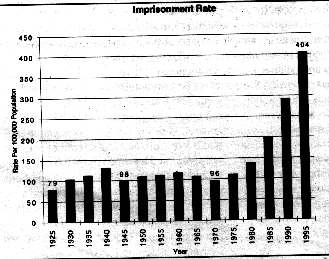
Graph 1.
As of September 30, 1998, there were 10,181 in Massachusetts prisons. Another 12,830 were in County jails.(2) That's 23,011 people in a state with 6 million people, or an incarceration rate per 100,000 of 384, well above the figures for most of the world.

Graph 1.

Graph 2. This graph represents the FBI's estimate of all violent crimes
committed, not just what crimes are reported. Of course, violent crime
committed by the government is ignored.(3)

Graph 3. This graph represents the incarceration rate since 1925. Note
that it held relatively constant until 1970.(4)
Defenders of the Amerikan injustice system argue that there are many stages before someone is sent to prison, so as to ensure that only the guilty go to prison. RAIL disagrees. The various stages of the injustice system, from the cops through the courts serves to ensure that while the laws may be written to apply to all people, it will be disproportionately the oppressed nations that see the fury of Amerikan justUS.

Graph 4. Each stage of Amerikan Injustice serves to make sure that
whites don't go to prison. Prison is about national oppression, not crime.(4)
In 1997, the number of incarcerated Black men passed the number of white men in prisons and jails, and close to ten percent of Black men aged 25 through 29 were in prison. RAIL points to these figures of national disparity in imprisonment because they prove that Amerikan prisons do not exist to serve anybody's justice. With Black men imprisoned at eight times the rate of white men, the prisons system exists to divide and oppress the Black nation and the other internal colonies through physical force.(1)
Things are no different in Massachusetts.
white Black "Hispanic" Asian Mass population: 89.8% 5% 4.8% 2.4% Mass prisons: 49% 29% 20% 1%Graph 5.(5)
From Graph 5, RAIL calculates a white imprisonment rate of 206 per 100,000 and a Black rate of 2194. Locking up 2% of the Black Nation is a rate 10 times that of whites.
Notes:
1. New York Times 9 August, 1998, p. 14. (The contrasts
between the white and Black nations in the prison figures are most stark,
but part of this is attributable to inaccurate or incomplete reporting
on Latinos in Federal surveys. Even with current reporting, 2.6 percent
of "Hispanic" men between 25 and 29 are in prisons and jails - compared
to 0.8 percent of white men the same age. But it is impossible to distinguish
between Blacks and the Latino nations with these categories because the
government does not clarify how many Latinos are of African descent, etc.
The article RAIL found on this subject also did not list any figures for
First Nations.
2. Mass DOC web page, Third Quarter 1998 Population.
DOC & HOC http://www.magnet.state.ma.us/doc/qrtly/98/thirdqrt/3rdtab1.htm
http://www.magnet.state.ma.us/doc/qrtly/98/thirdqrt/3rdtab3.htm 3. Walkin'
Steel Committee to End the Marion Lockdown, PO Box 578172, Chicago IL 60657-8172.
4. Abolish, Newsletter of National Campaign to Stop Control
Unit Prisons, Spring 1996, 972 Broad Street, 6th Floor Newark NJ 07102.
5. Mass population from 1993 Almanac Pharos Books; Prison
Population as of Jan 1 1996 from Mass DOC web site. http://www.magnet.state.ma.us/doc/Jan97.htm.
The DOC figures include First Nations in with the Asian number of 1%. All
figures suffer from the incorrect counting of Latinos.
6. Bureau of Justice Statistics, Corrections page. http://www.ojp.usdoj.gov/bjs/correct.htm